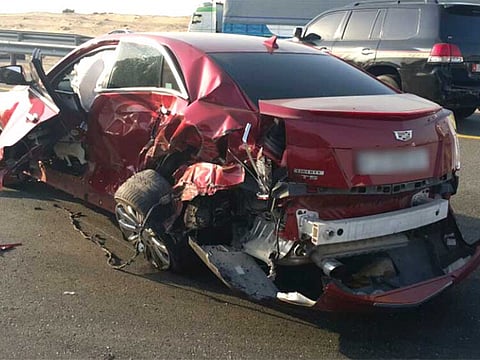Fast, but don’t be furious on roads
Experts call on drivers to be extra cautious during Ramadan

Dubai: Experts have called on motorists to be extra careful on roads during Ramadan as data suggests higher rate of accidents during the holy month.
This year, as with the last few years, Ramadan is coinciding with the hot summer and is expected to begin on Thursday, May 17.
Fasting coupled with the summer heat could cause dehydration and fatigue, drastically affecting the attentiveness, concentration, vision and action/reaction.
With a change in daily routines and sleeping patterns, driving gets affected leading to a higher number of accidents.
“Ramadan is a very special time and it’s all about being with the ones close to us, and this creates a lot of traffic. This festive period poses unique challenges for road users,” said Thomas Edelmann, Managing Director of RoadSafetyUAE.
Data suggests that 1,651 accidents were reported during Ramadan last year, attributed to lack of attention and rush hour traffic.
“The Ramadan specific lifestyle has physical effects on our body, especially when coinciding with the hot summer season like this year. Fasting can result in dehydration and low blood sugar, which in turn can limit our attentiveness, concentration, vision and reaction. In addition to fasting, the unusual eating and sleeping patterns can cause fatigue, exhaustion, impatience and distraction,” added Edelman.
According to a study conducted by RoadSafetyUAE based on the accident data from last Ramadan most of the accidents happened during mid-morning rush hour, which is also the hottest part of the day.
The study also suggested that older motorists need to be extra cautious with around 28 per cent accidents that took place in last Ramadan were caused by drivers aged 40 or above.
Among different nationalities, at 47 per cent Indians caused the highest number of accidents, followed by Emiratis who were involved in 14 per cent of accidents last Ramadan.
The study also showed that women are safer drivers than men, with men causing 77 per cent of the accidents.
Commenting on the findings, Frederik Bisbjerg, Executive Vice-President Retail i-Insured, said: “It is of utmost importance to know how the Ramadan lifestyle can affect our own behaviour, as well as the behaviour of other road users.”
He urged the motorists to be aware of their limitations, while watching out for other traffic participants potentially under the same limitations.
“Motorists must realise, that even if they arrive late for a Ramadan event, people will understand. Good time management is crucial and motorists are urged to leave early enough and allow for a time buffer to reach their destination on time. We need to display a caring attitude for ourselves and for others in this very special period,” added Edelmann.
Ramadan road safety tips:
• Be aware of your own limitations!
• Watch out for other road users potentially under the same limitations.
• Expect the unexpected, drive defensively!
• Plan your schedule properly and leave early to avoid the need of rushing and speeding.
• Plan a scheduled well- sleeping time, consistent meals time and regular exercise routine
• If you feel sleepy before driving, take a nap for not more than 15 minutes
• If you feel sleepy while driving, pull over immediately and take a short nap
• After the nap, get out of the car and walk about to help improve your blood circulation
• If you are not sure of reaching your destination by iftar time, better secure the Iftar meal with you and have it after stopping the car at a safe place rather than rushing.
• Avoid driving after heavy meal especially, after ending the fast
• Always maintain sufficient safe distance with the vehicle in front
• Always adjust your speed to the road and weather conditions
• Be more courteous and patient with other road users
• Give yourself plenty of extra time to arrive at your destination on time
• Avoid driving for long hours.
• Buckle up yourself and insist all your passengers to wear seat belt at all times
Sign up for the Daily Briefing
Get the latest news and updates straight to your inbox


